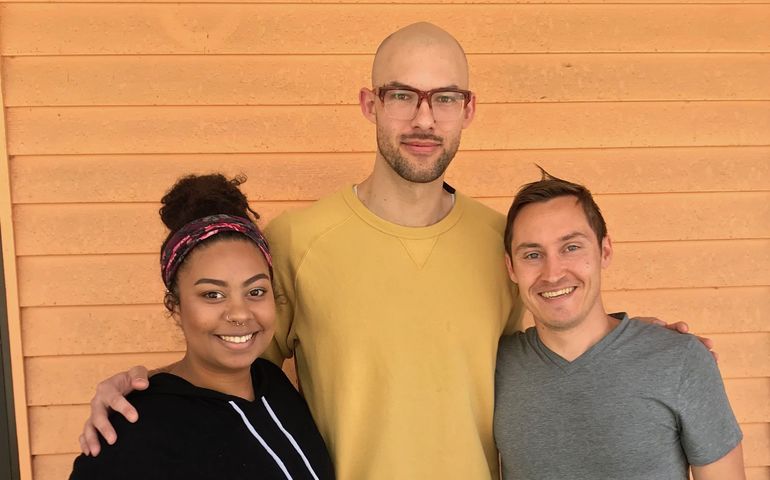
Q&A: Waterville startup mentor helps entrepreneurs connect ideas with markets
 Courtesy / Tortoise Labs
Nick Rimsa, center, and Brendan Barr founded Tortoise Labs, a software design and development studio in Waterville, which offers a free class that teaches people how to connect ideas to the marketplace. With them is Kia Jones, a “user experience” designer who has worked on contract with the company.
Courtesy / Tortoise Labs
Nick Rimsa, center, and Brendan Barr founded Tortoise Labs, a software design and development studio in Waterville, which offers a free class that teaches people how to connect ideas to the marketplace. With them is Kia Jones, a “user experience” designer who has worked on contract with the company.
Tortoise Labs is a software design and development studio in Waterville.
Founded in 2019 by product designer Nick Rimsa and software developer Brendan Barr, Tortoise Labs offers a free, multi-week product design class — in partnership with the Bill and Joan Alfond Foundation — that’s called “Move Slow and Learn Things.” It teaches students the skills to go from an idea to the marketplace. Tortoise Labs also partners with the Coastal Enterprises Inc.’s Women’s Business Center on the Propeller program.
The studio's business is developing software with a focus on rapid prototyping, and helping clients at all business stages to design and implement research strategies and tactics. Originally based at Bricks Coworking & Innovation Space, in downtown Waterville’s Hathaway Creative Center, the company shifted online due to the pandemic.
Rimsa graduated from Colby College in 2013 with dual degrees in psychology and economics. He worked seven years as a product designer at various startups, “software as a service” businesses and independent projects. He's also taught product design at Colby. In 2018, Rimsa and Barr founded an iPhone app called Eariously, which converts text into audio. In 2019, Rimsa and Bricks owner RJ Anzelc founded a startup mentoring program called Summer Startup. Rimsa and Anzelc were both on the Mainebiz Next list in 2019.
Over a dozen startup owners have participated in the Move Slow and Learn Things class, including TreeFreeHeat hemp-stalk biobrick developer Dylan Veilleux, the Good Crust pizza dough maker Heather Kerner, and SubLocal retail subscription app developer Reilly Kons.
Mainebiz asked Rimsa about the market for Tortoise Labs and how it fits into Maine’s startup ecosystem. Here’s an edited transcript.
Mainebiz: How did Tortoise Labs unfold?
Nick Rimsa: Things began at the beginning of 2019. I taught my product design course at Colby College. The purpose of the class is to introduce students to the basics of customer research — how to ask questions of potential customers in order to learn about their needs. My class was much more popular than I expected, and I continued to work closely with a number of students from class on their respective projects at the conclusion of my class.
The students whom I was working with were incredibly bright, but they weren’t sure how to take the first steps of building a product. It’s daunting to think about where to even begin. My thinking was that a class could be a solution to help people who had an idea but didn’t know where to start. The focus of the class is about identifying a customer, learning about what they want, and helping them to achieve it. The biggest startup problem is that not enough people start businesses, and students needed help taking the first steps.
I needed a physical space to work together with students and community members, so I partnered with Bricks Coworking & Innovation Space. The class has changed since I began teaching it, but it’s similar to the product design class I teach today in partnership with both the BJAF [Bill and Joan Alfond Foundation] and the CEI Women’s Business Center.
MB: How are you able to offer the class for free?
NR: The class is funded by a generous grant from the BJAF and with the help of Thomas College, specifically Mike Duguay [executive director of the Harold Alfond Institute for Business Innovation].
MB: How many folks have utilized the class?
NR: The initial class in partnership with the BJAF included 12 participants, and I’ll be teaching the next class beginning on Jan. 11, 2021. [The class is just about full, but interested participants can sign up here.]
Twenty-six women have participated in Propeller classes in partnership with the CEI Women’s Business Center. Participants use the classes to take the first steps of establishing their businesses.
MB: Could you provide an example of how you help students?
NR: Everything we work on is based on trying to help people build things that customers want. So when we work with folks, whether they’re students or members of the community, the class is focused on understanding how to talk with people, how to ask questions and learn what people want.
One project we’ve worked on in the last couple of years is called The Cubby, founded by Josh Kim, a student at Colby [and Central Maine Growth Council and KVConnect 2020 Emerging Leader of the Year: see sidebar]. It’s an online student marketplace.
When we started with Josh, we built a web app for his business. Over the course of a year-and-a-half, we helped him learn how to get customer feedback and turn that feedback into improvements in the app, then evaluating how well that worked and so on.
More recently, Josh has focused on selling student artwork. We’ve been focusing on helping him with customer research. For example, we talked about understanding how to identify customers, based on customer interviews.
MB: How do you teach customer research?
NR: All of our work stems from trying to make things that people want because, ultimately, if you don’t have customers, you don’t have a business. It’s like, ‘Hey, I have what I think is a good idea.’ If you keep that idea inside your head, you’ll never know if it’s actually good or not.
So we start in class by asking what everyone’s good idea is, and what their assumptions are about that idea, especially in the context of who the customer is. Then we test those assumptions. The way to test assumptions is by asking questions. You start by reaching out to potential customers. Potential customers are the ones who are already showing public signals that they might be potential customers.
In the case of Josh building a marketplace for college artists, one potential customer is someone who is decorating their home or apartment. They have some disposable income in order to decorate. They’re already proving they’re a customer because they’re already doing it. And because they’re already doing it, they’re more likely to try this new app.
Josh identified one group he thinks will be a good customer, and that’s people who just graduated from school and are decorating in some way and have a stable income. In the case of recent graduates, he likely knows a lot of people, so he might reach out and say, ‘I’m trying to learn more about how recent graduates decorate. Do you have 15 minutes so we can talk?’
MB: How does the research then connect people with the product?
NR: We teach the importance of follow-up. If Josh calls you because he’s identified you as a potential customer, at the end of the call you’ll probably ask, ‘Josh, why are you asking me all these questions?’ So Josh has an experiment set up where he can say, ‘I have these examples of student artwork that you can buy. Do you want to check them out?’ The most important factor in the experiment is understanding who will actually make purchases.
People don’t need the background or the expertise or the experience to do this, and they don‘t need to be technical. They just need to be curious.
MB: We note you have dual degrees in psychology and economics. Does psychology play an important role in this type of research?
NR: Absolutely. The biggest lesson is that asking questions and listening are important.
MB: In what ways does Tortoise Labs fit into Maine’s startup ecosystem?
NR: It’s my view that the biggest startup problem is that not enough people start businesses. I think, too, that it’s too hard for too many people to start businesses — poor people, recent graduates with student debt, parents of young children, rural Mainers without high-speed Internet, marginalized groups of people.
Our team is focused on helping people — especially from these groups — take the first steps of building their software or software-enabled business. Those first steps are identifying a customer, learning about what they want, and helping them to achieve it. It’s helping Mainers to make things that people want. It’s very important to us that our classes are free so that cost is not a deterrent to anyone who wishes to participate.
MB: How did you come up with the name Tortoise?
NR: Facebook used to have the slogan “move fast and break things.” We have the credo that we should move slowly and learn things because we’re focused on customers and their needs.














0 Comments